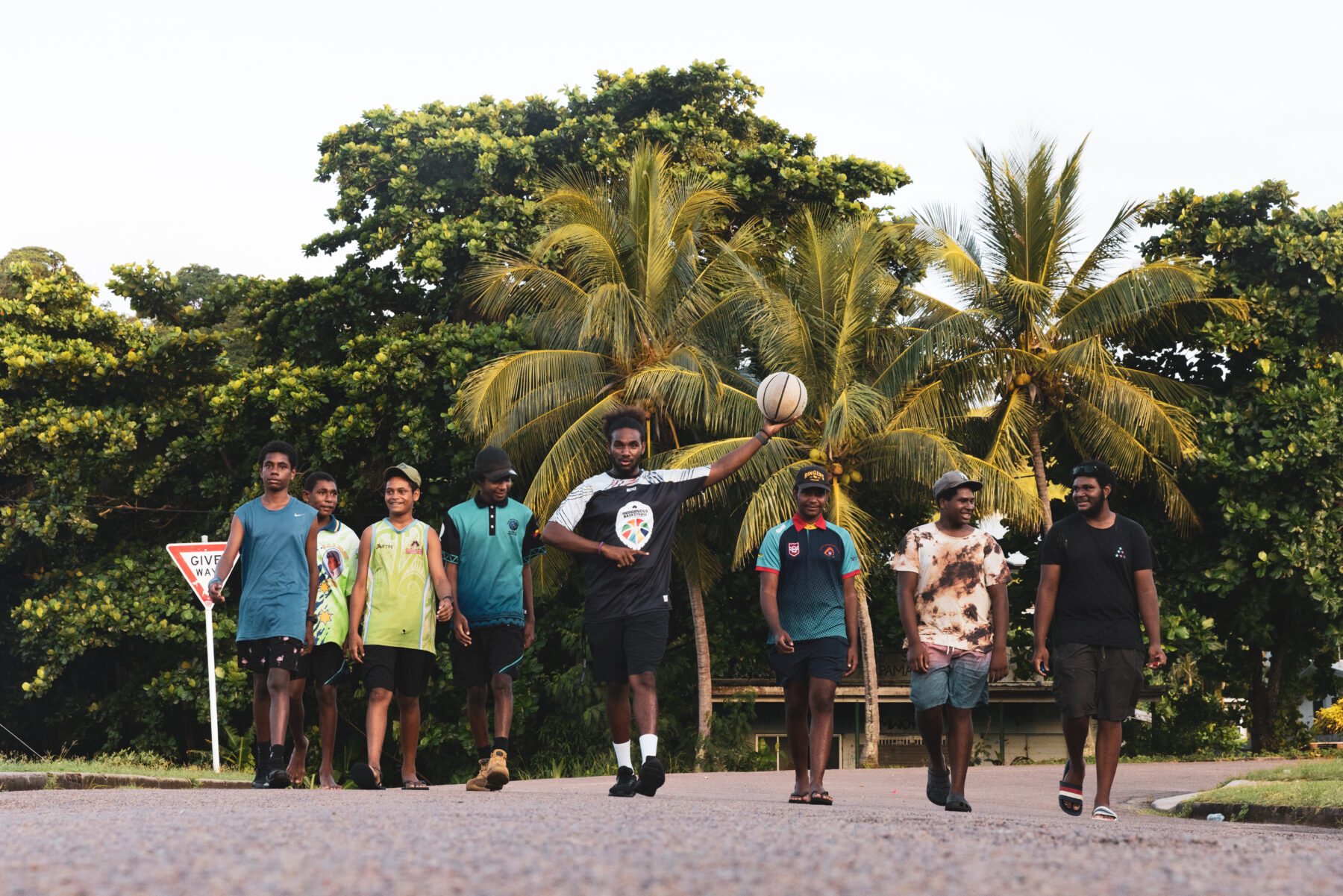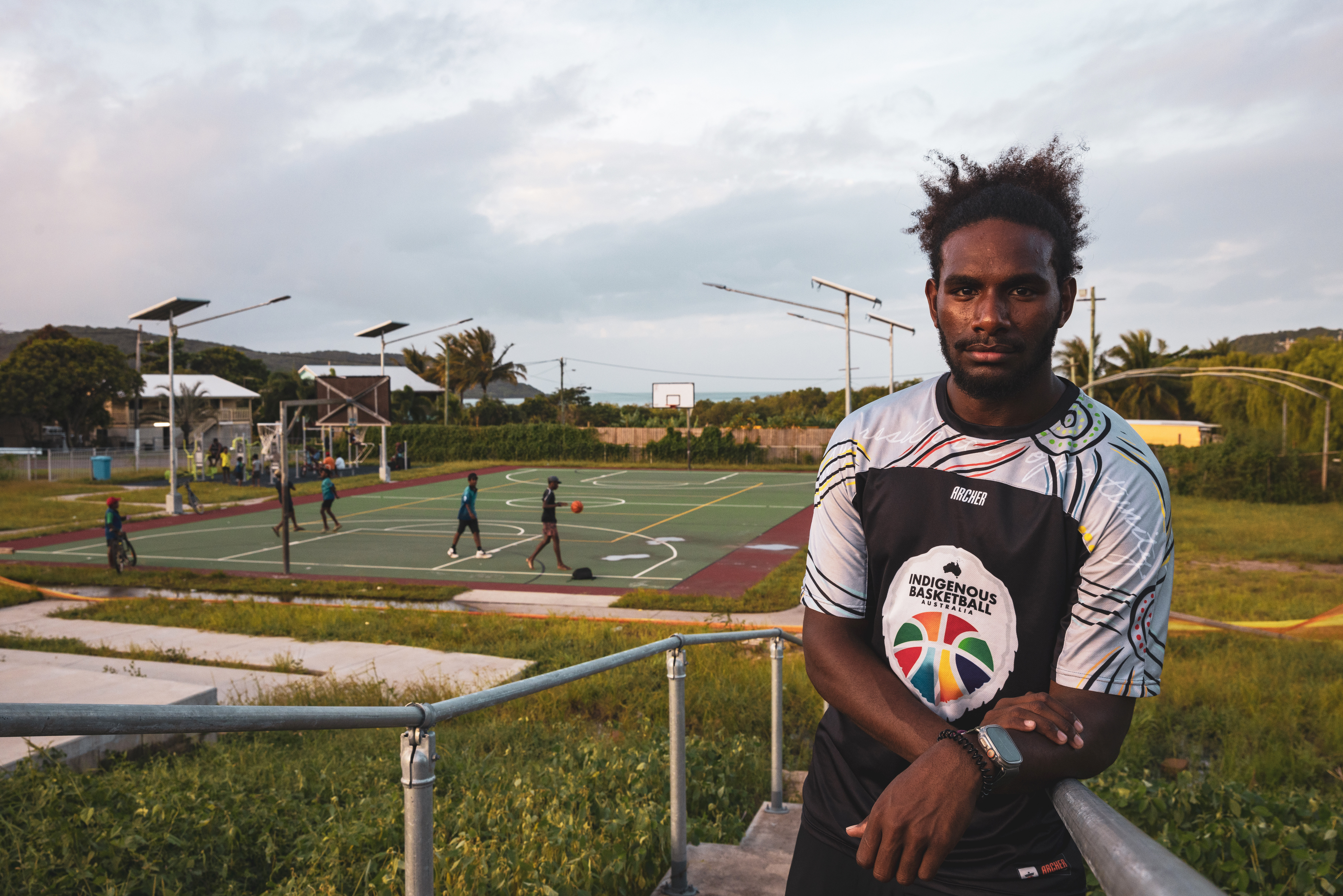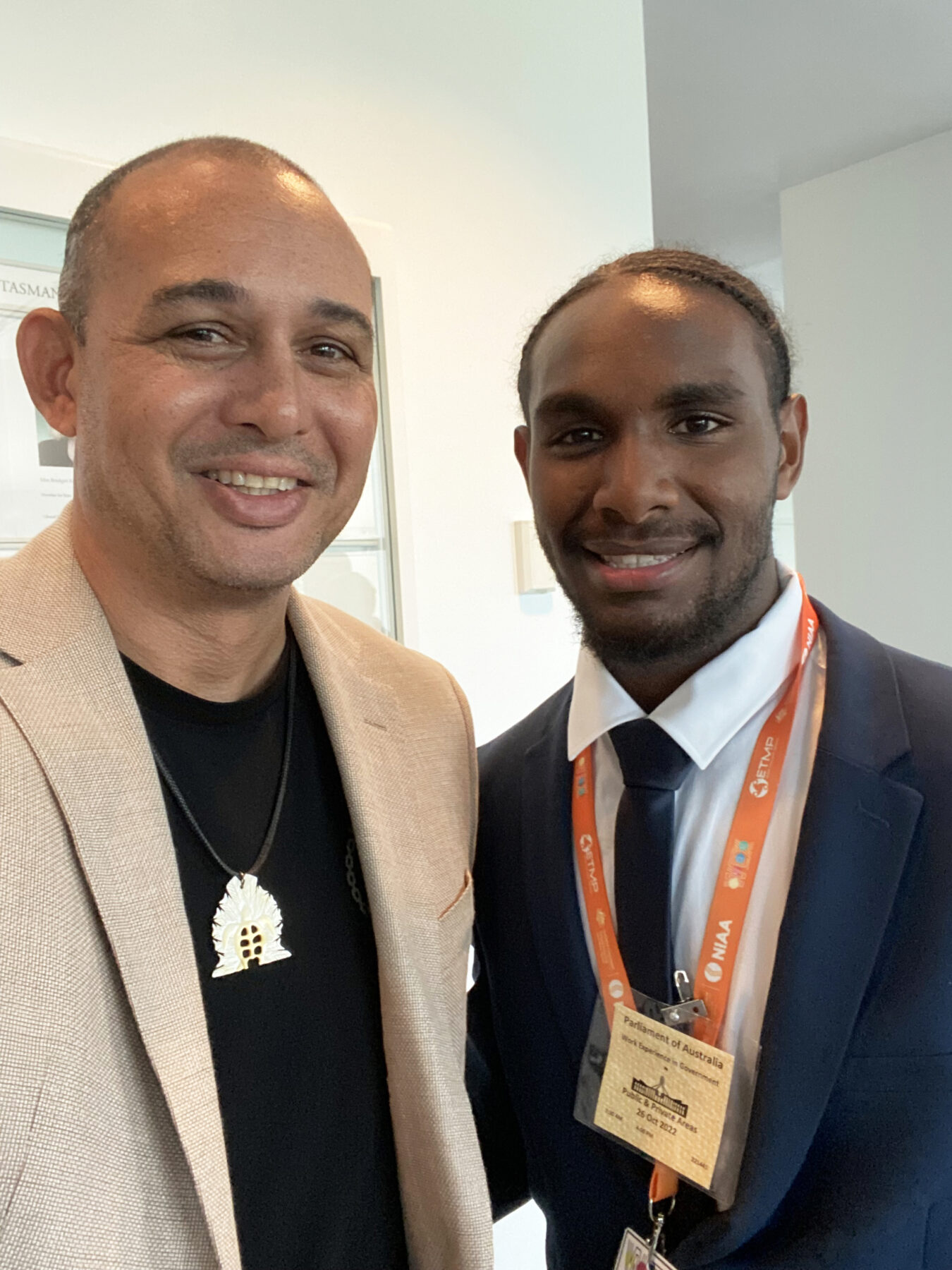Listening to the voices: Kailua George Jr

This is one of a series of interviews between First Nations advocate Thomas Mayo and the Indigenous community leaders he met when he toured Australia in 2019 with the Uluru Statement from the Heart.
Kailua George Jr
Torres Strait Islander
A young man – impressive, tall, with a deep voice and a presence, even among senior leaders from the many islands of the Torres Strait – Kailu George stood to deliver a speech on behalf of the youth, exactly where his grandfather’s grandfather had done on a tiny island called Masig back in the very early days of the Torres Strait Island Regional Council.
It was August 2022 at the anniversary of the first meeting, a meeting that is famous and celebrated among islanders. It came from an enormous struggle against injustice that every Australian should learn about.
Torres Strait Islanders are one of two major Indigenous groups in Australia. I am a Torres Strait Islander; we have a distinct flag and culture. In 1901, when the White Australia policy was enacted by the new federation of Australia, the fishing vessels that Torres Strait Islanders owned and successfully operated were confiscated by government authorities.
The island men were forced to work on them for mere rations while their communities lived in poverty.
By 1936 tensions had reached boiling point and the Torres Strait Islander boat crews went on strike. In the months before, the workers had communicated the timing of the strike to each other by leaving messages under coral bommies on the reefs.
They stood their ground, achieving one of their key demands: the formation of a Torres Strait Islands Council – a Voice for the Torres Strait Islander people. The first meeting was on Masig Island. I was fortunate enough to be at the anniversary with young Kailu, a namesake of his ancestor. Kailu senior was one of the first councillors, representing the Erub Island community.
I interviewed young Kailu more recently. I wanted to share his story because I was impressed by his poise and his grace at that anniversary meeting. I saw how he listened as the minutes from the 1942 gathering were read, his pride shining through when Kailu senior’s words were read.
Kailu explained to me back then, “I got an invitation from Mayor Uncle Phillemon Mosby to go to Masig because I was school captain in Year 12. He asked me and the other school captain, Nina Lui, to address the leaders from the Torres Strait on behalf of our youth.”

Kailu is now in his 19th year. He’s working two jobs. He’s a lifesaver at the Thursday Island pool, and when UAV Industries Marine – a maritime training and development organisation specialising in courses for Indigenous students – delivers a regular coxswain course, he’s an assistant for the trainer and assessor.
Kailu continues to study, working towards a masters ticket – a licence to operate larger vessels.
Brought up by his grandparents in accordance with traditional island adoption, Kailu was raised as that generation was. “I was brought up in the old ways. It was a strict upbringing, always going to church. I loved the preaching, especially by Athe (grandfather) Pedro Stephen, and Uncle Gabriel Bani’s singing too,” Kailu says. “I think it is the best way to be raised – with discipline. It’s good to be humble and respectful.”
He gives an example. “When two uncles are talking, and you need to walk in between them, or even just passing them, you don’t just walk straight by. A youth bows his head and says ‘excuse me’. There is less of that respect today from youth. But Elders appreciate it when young people know that respect.”
I relate to this. I was raised in the same way by my Torres Strait Islander father who was born on Thursday Island. We talked about the islander word for how we were taught to be respectful and to listen.
“The word for it is sesthaman,” Kailu says. “It’s a person who is respectful, humble. A person with situational awareness, who listens, watches and observes something or someone. It is like that small gesture, the nod of the head that has a lot of meaning, that shows the personality of that person. It is a sign of a leader to be humble.”

As Kailu made his way through school, he found his voice. He talks about what a shy boy he was, and how he developed a love of basketball watching his father play. When he wasn’t selected to play in the rep side, he practised and persevered until he was. But when he went to Cairns, he got homesick and stopped playing for a while.
“I then took up leadership opportunities – in Year 10 we went to Bampfield Beach on Prince of Wales (Muralug) Island for a leadership course,” Kailu says. “My confidence started to come through and I got back into basketball and started refereeing.”
With a smile from ear to ear, Kailu tells me about his most recent adventure, to the tiny island of Masig where we met.
“I had sprained my ankle at basketball the night before we left Thursday Island. It was so swollen, it was hard to climb on to the ferry to Horn Island to catch the plane to Masig. I was writing my speech in the plane, and when we landed on Masig, I put my feet on the ground and my ankle suddenly felt good. I could run!” Kailu laughs. “I got one photo of me running, I’ll send it to you, the pain be go away!”
Kailu pauses in thought, and then says, “I felt spiritually connected to that island where my grandfather was part of the first councillors’ meeting. When Athe Pedro Stephen introduced me before I gave my speech, he talked about the prophesy of my life. When I was born, Athe spoke at the church. He said he saw a vision about what I can do and what I am capable of. He said ‘this boy has fire in his hands’. Still to this day I don’t know what that means, I am just taking each day slowly.
“For Athe to talk about that in front of all those leaders from across the Torres Strait, it was amazing,” he says. “I still have people come up to me now and shake hands. It was a blessing.”
Kailu’s speech was brilliant. He represented the youth well. The Elders were proud. Soon after Kailu’s speech, the leaders of the Torres Strait made the Masig Statement – Malungu Yangu Wakay (Voices from the Deep). It is an expression that means the Torres Strait wishes to speak with one voice, joining theirs with our Aboriginal brothers and sisters on the mainland as was called for in the Uluru Statement from the Heart.

The second time I met Kailu was in Parliament House in Canberra in late 2022. He was selected with other young Indigenous leaders from around the country to experience how decisions are made about our lives, thousands of kilometres from our island home. Kailu believes our history is important to our present and our future.
He talked about how inspired he was to learn about the Gurindji Wave Hill “walk-off” and other courageous efforts our people have made, not just at home in the Torres Strait, but throughout the mainland as well.
Kailu hopes we will make history again. He hopes we will win the referendum that will recognise us as First Peoples, by ensuring we have a Voice to the decisions that are made concerning us.
He expresses sadness about the misinformation he sees in the media. “When they say we already have a Voice, you think, How can they ignore that our people have suffered for such a long time.”
“I’ve been telling other youth about our history, what I’ve learnt; about how a Voice, when we win the referendum, is something that we can pass on to future leaders.
“We talk about it when we play basketball,” he says. “We talk about it when we play football. All this small, small talk, you may not move all them kids, but I know I might get one or two who take what I’m teaching them, and it will be stuck with them.
“And I think about how I was, just recently – that shy one just sitting there, sesthaman, but will soon explode with that knowledge and do good things.”

The Voice to Parliament Handbook by Thomas Mayo.
RRP: $16.99 from the Australian Geographic Shop





